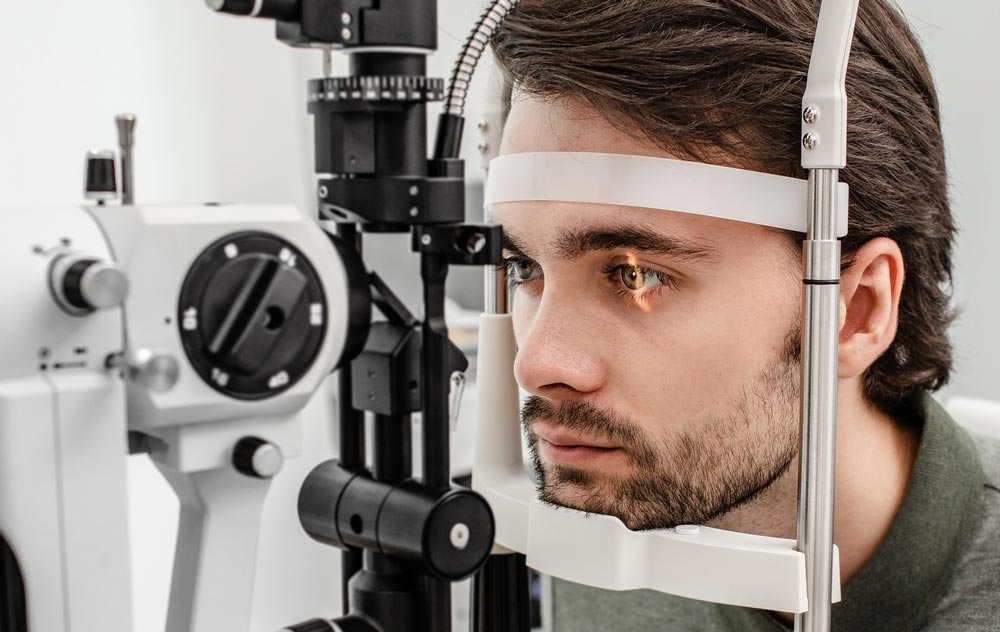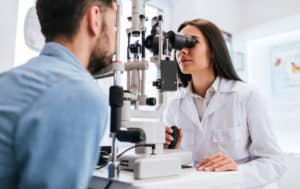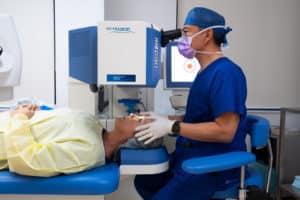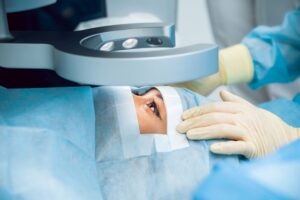Monocular vision, where one eye significantly underperforms or ceases to function, presents a unique set of challenges. This blog post aims to provide a clear and comprehensive exploration of what living with monocular vision involves. We will discuss the critical importance of early detection, practical adjustments for daily routines, the role of visual aids and therapies and the emotional aspects of this condition. Our focus is to offer insightful and supportive strategies, enhancing awareness and support for those navigating the complexities of monocular vision.

Early Detection: Key to Managing Monocular Vision
Identifying the initial indicators of monocular vision is important. These signs might be understated, manifesting as alterations in depth perception or challenges in estimating distances. If this issue develops in childhood, it can also manifest as a “turned eye” or strabismus. Often there will be no signs and will instead be picked up during routine eye tests with your optometrist or ophthalmologist. Optometrists and Ophthalmologists can detect and tackle these issues promptly, helping to prevent them from becoming more complex issues.
Adapting Daily Routines for Monocular Vision
Living with monocular vision requires certain lifestyle adjustments:
- Enhancing Lighting: Adequate lighting in your home and workplace can help compensate for reduced depth perception.
- Organising Space: Keep your surroundings clutter-free to minimise obstacles that could lead to accidents.
- Driving Safely: If you drive, it’s essential to be extra cautious and avoid risky situations. You must also learn to compensate for any lost peripheral vision by learning “scanning” techniques.
- Sports and Activities: Consider taking up sports and activities that don’t rely heavily on binocular vision.
Ophthalmologists can provide personalised advice based on your specific needs, making these daily adjustments easier to implement and more effective in improving your quality of life.
Visual Aids and Rehabilitation Therapies
Technological advancements have opened up new possibilities for individuals with monocular vision. Ophthalmologists can recommend and integrate various visual aids and rehabilitation therapies into your treatment plan:
- Prism Glasses: These specialised glasses can improve depth perception by manipulating the way light enters the eye. These are only suitable if you also have a “turned eye” or strabismus.
- Vision Therapy: Ophthalmologists may prescribe exercises to improve eye coordination, depth perception and potentially improve vision in an eye with reduced vision.
Navigating Emotional Challenges with Monocular Vision
Living with monocular vision can introduce a range of emotional and psychological challenges. These can include:
- Adjusting to Loss of Depth Perception: Learning to live with altered spatial awareness and depth perception.
- Fear of Accidents: Concerns about increased risk of accidents due to changes in vision. Also the fear of losing vision in your good eye.
- Emotional Impact of Vision Loss: Dealing with feelings of loss, frustration or sadness associated with vision changes.
- Social Concerns: Anxiety about social interactions or activities that may be affected by vision loss.
The Critical Role of Regular Eye Exams in Monocular Vision Management
Regular eye exams play an important role in the management of monocular vision. These exams are key in detecting any changes or issues at an early stage. Even if there is nothing that can be done to improve vision in your weaker eye, it is more important to get regular eye exams so that any changes to your good eye can be picked up and treated early, preventing or minimizing any further loss of vision.
This proactive approach is vital in maintaining vision health and addressing any concerns as they arise. Regular eye exams are an important part of the care strategy for anyone with monocular vision, helping to keep track of their ocular health and manage their condition effectively.
Discuss Your Vision Needs with Our Team
At Pacific Eye Clinic, we provide a range of eye care services, including managing monocular vision. Our team provides tailored care for your individual needs. We recognise the unique challenges you may face with monocular vision and are here to offer support throughout your journey. If you’re noticing changes in your vision or are interested in learning more about our services, schedule a consultation with us.
Author

Dr Marc Wei
Dr. Marc Wei is the principal specialist laser and cataract surgeon at Pacific Eye Clinic in Southport on the Gold Coast. He has 20 years of trusted experience in advanced laser cataract surgery and has completed more than 15,000 procedures over the course of his career.



